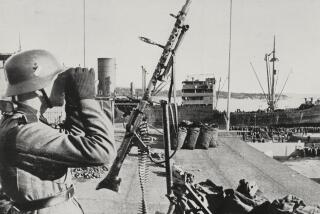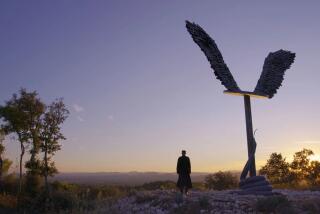‘I didn’t feel oppressed. In a way, I was privileged.’
Katrin Geissler remembers being 4 years old and on her way to ballet school when she first tried to peek through the wall.
“You would just try to get a glimpse. . . . It was very strange, because as a child you had the wildest imaginings about what was on the other side. . . .
“For me, the wall was just a reality. I knew about it even before I went to school. When I was little, my grandmother would take me to town and she would explain to me that this was the wall that divided the two cities.”
Katrin’s parents had experienced a very different Berlin in the aftermath of World War II.
“They would talk about how it was very common to live in East Berlin and work in the West, and in the West you had things you didn’t have in the East, like oranges and bananas. You could take those back and trade them for things.
“There was still a lot of communication going on between the American and the Russian sectors. The trains would go back and forth. The city was alive as a whole.”
But shortly after Katrin’s birth in 1961 in the northeastern suburb of Bernau, the Berlin Wall went up. Her father’s job helping to build machines in the West ended overnight. Later, when she was a schoolchild, communist indoctrination became part of the curriculum.
“Apparently there was a blacklist in Bernau, and my father was on it because he worked in the West. People who worked in the West were called ‘border walkers,’ and they were politically suspect.
“It was the other side of the fence. At school . . . we were taught that we were the better people, that capitalism was evil, that we were the future, that the sun rises in the East.”
At 18, she joined East Berlin’s Komische Oper as a dancer, -- and got her first taste of the workings of the Stasi, the East German state police, which spied on practically everyone.
“The first time I experienced something like that personally was when we were supposed to go on tour for the opera, and the Stasi actually went around the house and asked the neighbors about me. The neighbors sometimes knew before I did that there was going to be a tour.”
Yet, perhaps because it was all she knew, life was not intolerable for Katrin, who steered clear of politics. Neither she nor her family thought of fleeing, though thousands of others succeeded in doing so, through tunnels, ingenious hiding places in cars, even by hot-air balloon.
“I didn’t feel oppressed. In a way, I was privileged. My training was free. I could study for free. I got everything I wanted. If there was something I didn’t get because of them, because of the Stasi, I didn’t know about it. . . .
“There was no one in my circle of friends who tried to flee. But at the opera company, there would be people who would stay in the West when they were on tour; suddenly there would be one fewer person in the orchestra.”
The status quo seemed unlikely to change. But as Katrin nursed Valentin at home in late 1989, anti-communist demonstrations in East Germany began building in force. And as incredible as it seemed, word came that East Berliners, after a generation of being separated from the West, were being allowed to cross to the other side.
“At that time we had a visitor from Bulgaria. . . . He came back from a trip to West Berlin and said, ‘The wall has fallen, and you can all go over there.’
“I thought, no, that can’t be true, and he said, ‘Turn on the TV.’ . . . It took really a long time before I got over the shock and dared to cross over to the West. It was too strange for me, and I also didn’t trust that it was really allowed.
“I went two weeks later. Everybody else had already gone and they said, ‘Don’t you want to go too, and have a look?’ . . .
“I crossed at Checkpoint Charlie. It was anxiety-inducing for me. At that time the wall was still there -- now you can’t see anything of it anymore -- and there was a long border strip you had to cross. There were soldiers, and you could see the towers, and there was a tiny gap in the wall where all these people were trying to get through.
“It wasn’t like with the people on television who were all so happy. To me it was more frightening. I didn’t feel liberated at that moment. . . .
“It didn’t sink in right away at the beginning. I thought they might just close the border again; it would’ve been very easy to do. It wasn’t until much later when everything had settled and everyday life started up again that I started to think of the opportunities it meant and to make plans for the future.”
Now, 20 years later, Katrin is, in many ways, a new person. She has a new career as a certified physiotherapist. Two years ago, after nearly four decades of living in Berlin, she moved back to Bernau, though she still works in the city.
Germany’s reunification has not been trouble-free, and at heart, there is still something of the old East German inside her.
“I learned a new profession partly because I had to but also because it was a new opportunity. I traveled a lot. I couldn’t have done that in the DDR [Deutsche Demokratische Republik, or German Democratic Republic, as East Germany was known]. For me it’s just a great thing to see new things, widen your horizons, have new experiences. . . . I wouldn’t want to be without that.
“[But] there’s a great deal of insecurity; people are afraid for their existence, whether they’re going to be able to make a living. . . .
“In the DDR, it was like a little dollhouse; you would get a job, you could make a living. A doctor in the hospital would make the same as a regular worker, so the social differences weren’t so great. There was also a greater appreciation of labor. It didn’t matter whether you went to university or not.
“Today life is faster, more hectic, and you have to deal with it, or you go under.
“The East mentality has definitely stayed with me. I was 28 when the wall came down. I spent my formative years, my childhood, my education, my university years there.”
But she hasn’t forgotten the magical moment when that feeling of liberation finally hit her, months after the wall fell.
“The first time was probably when I went to France or Italy and saw the ocean and had the feeling of the wide world before me. In ‘91, I went to New York. It’s as though stepping over the border was difficult, but going to New York, flying over the Atlantic, was easy. And at that moment, I felt happy.”
More to Read
Start your day right
Sign up for Essential California for news, features and recommendations from the L.A. Times and beyond in your inbox six days a week.
You may occasionally receive promotional content from the Los Angeles Times.







